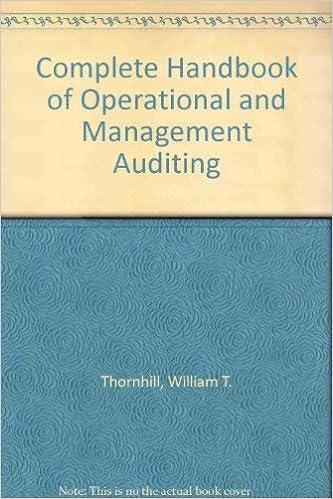Question
1. Which of the following costs are the benefits that are forfeited or lost when one alternative is chosen over another? A. Sunk cost B.
1. Which of the following costs are the benefits that are forfeited or lost when one alternative is chosen over another? A. Sunk cost B. Direct cost C. Incremental cost D. Opportunity cost 2. When are sunk costs omitted from decision analysis? A. Always B. Only if necessary C. Only if they are immaterial D. Never 3. When faced with a make-or-buy decision, managers need which item of information about making? A. Variable costs of making the item B. Need for additional machinery C. Incremental fixed costs D. All of these choices 4. An example of a constrained resource that may lead to the need for a sales mix decision is A. labor hours. B. machine hours. C. a common part/ingredient with limited availability. D. all of these options. 5. Relevant costs in a sell-or-process-further decision include A. only costs of additional processing. B. joint product costs. C. total revenues after additional processing. D. both additional revenues and additional costs. 6. Estimated future costs that differ between alternative courses of action are termed as __________ costs in management decision analysis. A. replacement B. relevant C. sunk D. absorption 7. Candidates for outsourcing would include A. custodial services. B. payroll processing. C. information management. D. all of these choices. 8. Which of the following is an irrelevant cost in deciding whether or not to eliminate a producing department? A. The salary of a supervisor who would be laid off B. Revenue that could be generated by renting out the department's space C. The current residual value of the department's equipment D. The carrying value of the department's equipment 9. With a special order decision, relevant qualitative factors include all except A. the customers ability to maintain an ongoing relationship. B. the special orders impact on operating income. C. the impact of the special order on regular customers. D. the potential of the special order to lead into new sales areas. 10. Sales commissions would be excluded from special order decision analysis because A. they are fixed costs and therefore irrelevant. B. they are administrative expenses. C. the customer approached the company directly. D. they are relevant variable costs.
Step by Step Solution
There are 3 Steps involved in it
Step: 1

Get Instant Access to Expert-Tailored Solutions
See step-by-step solutions with expert insights and AI powered tools for academic success
Step: 2

Step: 3

Ace Your Homework with AI
Get the answers you need in no time with our AI-driven, step-by-step assistance
Get Started


